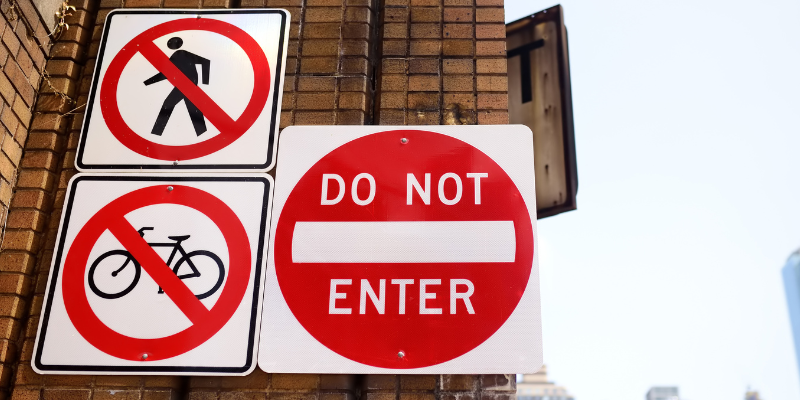Understanding international shipping restrictions is crucial for eCommerce merchants to achieve success when transporting goods across borders. As a dominating practice contributing to our global economy, international trade has forever changed how businesses reach new markets. With U.S. exports of services bringing in $928.5 billion in 2022 alone, international trade stimulates economic growth, job opportunities, and accessibility to global goods and services. But it’s important to understand the shipping restrictions present in different countries that could make the process difficult if not approached correctly.
This blog will discuss common items restricted for international travel, how to comply with customs to avoid shipping delays, and how to partner with a trusted shipping provider to guide you through the complicated process with ease.

Understanding International Shipping Restrictions
When researching international shipping rules, it’s crucial to identify the key differences between the terms restricted and prohibited. Restrictions may refer to rules or regulations imposed by a country’s government to protect the safety of its residents and prevent environmental or security threats. Prohibited items are completely forbidden and may never cross international borders.
Restricted items vary from country to country and may be allowed under certain conditions. Hazardous materials may be marked as prohibited or restricted, depending on the destination country. For example, in the EU, rough diamonds, certain nuts, and pepper spray are restricted from travel. In Canada, firearms, tobacco products, CBD, and illegal drugs are strictly prohibited from importing.

Types of International Shipping Restrictions & Prohibitions
International shipping restrictions are designed to prevent prohibited or hazardous (HAZMAT) goods from crossing international borders. Each country sets its own laws and regulations regarding restricted items and a formal list of prohibited items for viewing. Commonly restricted items include:
- Gasoline
- Aerosols
- Air Bags
- Dry Ice
- Firearms
- Nail Polish
- Ammunition
- Tobacco products
- Counterfeit goods
- Alcoholic beverages
- Food or items for human consumption
- Mercury filled thermometers
- Perfumes (containing alcohol)
- Lithium batteries
The following items may be sent internationally should they meet country-specific regulations:
- Prescription drugs and prescription medications (if mailed by Drug Enforcement Administration (DEA) registered distributors)
- Human remains (must use priority express mail and the appropriate customs form)
- Perishable items (must be packaged accordingly)
- Flammable or combustible materials (must be labeled properly)
- Firearms (if mailed by licensed manufacturer)
- Endangered Species/live animals (require a special permit or are entirely prohibited)
Domestic and international shipping regulations are constantly changing. Staying knowledgeable about regulatory changes when shipping to a foreign country can prevent delays when transporting goods across borders.
Import/Export Restrictions: How to Ship Compliantly
Now that we’ve discussed commonly restricted items, it’s critical to understand the import and export restrictions that can affect international trade.
Each government has stringent policies regarding which goods can be imported or exported into their country. Specific documentation, shipping rates, customs duties, taxes, and tariffs will vary according to the jurisdiction. While each country is different in the rules and regulations required for international travel, the customs clearance process is relatively the same.
You can expect to complete the following steps when shipping sensitive items across borders.
- Identify if your product complies with your targeted country’s list of restricted or dangerous goods.
- Complete a customs declaration to accurately declare your shipment’s contents and purpose.
- Obtain the proper licensing or permits (typically for firearms or technical equipment.)
- Package and label your shipment per local and federal regulations.
- Adhere to your corresponding trade agreement regarding restricted goods and pay all applicable customs duties and tariffs.
Along with the standard procedures to follow, there are additional precautions to take when dealing with international shipping restrictions. For example, certain governments will enact trade restrictions with a specific country or multiple countries, also known as an embargo. Embargos prevent goods from being imported or exported from one country to another.
The United States embargo sanctions, prohibits all imports and exports to Cuba, North Korea, Crimea – region of Ukraine, Syria and Iran without a license authorization. Leaders may also impose financial sanctions and travel restrictions to freeze assets held by individuals, entities, or governments in the embargoed country and restrict travel from specific individuals. Violations can result in damaging legal consequences that may be hard to come back from.
Establishing a formal trade agreement can prevent eCommerce businesses from hitting a roadblock in their international shipping process. Speaking with a customs broker or experienced shipping provider can also help shippers navigate the complicated process of international trade.
Real-World Examples for Delays: How to Prevent Shipping Disruptions
The most common cause for delays with customs agents is failure to correctly complete a customs declaration and provide an accurate commercial invoice. Improper documentation, especially for restricted items, can dramatically delay a shipment. Average customs clearance time takes around 12- 24 hours; however, if items are seized, clearance could take several weeks, potentially resulting in your items being destroyed by customs agents or sent back to their place of origin.
Often, restricted items are subject to inspections, particularly if the declaration form is not filled out adequately to declare the items properly to customs.
Consider this scenario:
Lucy wants to transport a large shipment of scented candles to Ireland from the United States. Lucy knows the ins and outs of shipping her candles across borders, as she’s successfully done so many times before. However, this time, Lucy decided to include a box of matches with her business name printed on them as a special gift to her Irish clientele. She selects priority mail with air travel with her postal service to get her customers their packages promptly. What Lucy failed to consider is that matches are prohibited from air travel and must be sent via ground transportation. To make matters worse, strike-anywhere matches may not be mailed domestically, as they can ignite from friction against a surface. Lucy’s shipment was seized with customs for attempting to ship restricted items.
Failure to obtain proper permits or licensing may also delay shipments and poor descriptions on customs declarations rank as one of the top reasons for shipping gaps.
Here’s another scenario to consider:
John is shipping a large case of the latest smartphones to an international buyer in the EU. John has researched the corresponding customs duties and purchased extra packaging material from his local post office to ensure the phones reach their destination with zero damage. To ensure the product’s safe and timely arrival, John separates the lithium batteries from the devices to package them more securely. John did not realize that lithium batteries are not permitted for travel if not properly installed in the equipment they are being shipped in.
John also failed to accurately declare the cell phones on his customs declaration. He listed the cell phones as “technical equipment.” Customs declaration forms require specific details for clearance. For example, if you send electronics, the shipper must indicate what type of electronics they are shipping, like a cell phone, computer, or television. In John’s case, the battery would also need to be listed.
If the correct documentation is not accurately completed or presented to customs officers, the items may be subject to additional scrutiny. Open box inspections are possible, but it’s often due to a lack of documentation declaring what exactly is in your package.
The Consequences of Non-Compliance
Understanding county-specific international shipping restrictions is crucial for businesses participating in international exchanges. Failure to comply with a country’s policies regarding prohibited or restricted materials could result in customs delays, timely inspections, seizure of products, or detrimental legal consequences. In most cases, a shipment will be seized or returned to the country of origin. Customers put their trust in a business to help them receive their items safely and promptly. Shipping delays may cost more than just added customs fees; they could cost your brand’s reputation.

The Value of Working with a Trusted Shipping Provider
Experienced shipping providers with international knowledge of regulations, restrictions, and shipping policies can help your business find its way in the complex world of international trade. Experienced providers have a deep understanding of international shipping regulations and how to help you achieve compliance, no matter the restrictions or destination.
Everything from managing customs duties and assisting with documentation to mitigating risks of non-compliance is done for you with a trusted shipping partner by your side. Expanding your market to new international territory can be a lucrative opportunity, but it requires careful consideration of customs regulations and shipping restrictions. Our international parcel and mail shipping solutions allow businesses to streamline global distribution while increasing customer satisfaction.
Understanding and complying with international shipping restrictions is a complicated task. Country-specific prohibitions, added-costs, and shipping stipulations make the process a hard one to navigate alone. Working with a trusted partner can help you understand how to ship your items compliantly to avoid shipping delays and costly fees that could hinder your business.
If you’re ready to begin shipping internationally, book a call with one of our experienced shipping specialists to get started.




